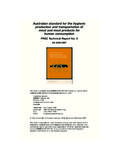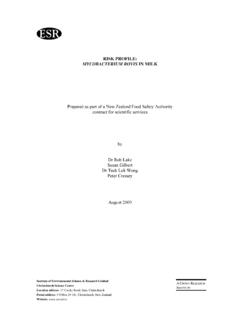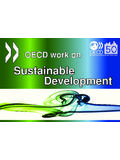Transcription of chapter 4
1 chapter 4 competencies FOR THEKNOWLEDGE ECONOMYSUMMARYP ressures to increase the role of information and knowledge in national economieshave provoked a wide-ranging debate about what kinds of competencies youngpeople and adults now workforce is upskilling , both in terms of the average educational level of workersand the types of job that they are performing. White-collar, high-skilled jobs aredriving employment growth. This is not just a question of the growth in knowledge sectors . Work is becoming more skilled across industries and within group of knowledge workers can be identified as those performing knowledge -richjobs.
2 Such workers are typically but not universally well educated. Some knowledgeworkers have high levels of literacy and lower levels of education, implying that basicskills obtained beyond education are recognised in the knowledge are additional workplace competencies needed in the knowledge skills, problem-solving skills, the ability to work in teams and ICTskills, among others, are becoming important and complementary to basic core orfoundation skills. Even more than other workers, knowledge workers rely on , further research is needed to inform education policy makers about howto develop the right skills for a knowledge economy , rather than assuming that highlevels of education alone, as conventionally defined, will be 4 competencies FOR THEKNOWLEDGE economy OECD 20011001.
3 INTRODUCTIONThe emergence of the knowledge economy , partly attributed to globalisationand technological advances, has ushered in a wide ranging debate about thedemand for higher levels of competencies . While there is growing agreementon the importance of skills per se as a key engine for economic growth (OECD,2000f) and the spread of the knowledge economy , there is far less agreement onwhich competencies and skills make the difference. Within and outside of theeducation sector, the discourse often refers to higher educational attainment ingeneral, focused on the development of broadly-based competencies that cansupport further lifelong learning.
4 From a labour market perspective, there isalso an increased attention given to specific competencies such as the ability touse information and communication technologies (ICT), to solve problems, towork in teams, to supervise and lead and to undertake continuous learning. Ifnot necessarily new, these so-called workplace competencies now tend in thewider public debate to be distinguished from what is taught and learned in thecourse of regular schooling and tertiary education study kinds of competencies are important for success in the knowledgeeconomy?
5 This chapter seeks to inform the on-going debate by trying to answersome questions related to the competencies required to participate effectivelyin the knowledge economy . Such an understanding is important for reformingcurricula, developing appropriate assessments and providing the kinds ofincentives most likely to promote the development of needed competencies . Section 2 surveys evidence on how the demand for competencies appearsto be evolving in response to the forces at play. Section 3 surveys the literature to offer evidence on the different types ofcompetencies required to participate in the knowledge economy : It reviews the importance of basic education and literacy skills in theknowledge economy and for so-called knowledge workers.
6 It analyses the extent to which further workplace competencies arebecoming commonplace. Section 4 draws together what is known about the demand for competenciesin the knowledge economy , drawing attention to information gaps and THE knowledge Technological change and ICTsThe concepts of knowledge economy and knowledge worker are based onthe view that information and knowledge are at the centre of economic growthand development. The ability to produce and use information effectively isthus a vital source of skills for many individuals (OECD, 2000e).
7 Technological change and innovation drive the development of the knowledge -based economy through their effects on production methods, consumptionpatterns and the structure of economies. Both are closely related in recentgrowth performance. Some changes in innovation processes could not haveoccurred without ICTs and conversely, some of the impact of ICTs might nothave been felt in the absence of changes in the innovation system (OECD,2000a). These changes also have affected the way in which organisationsThis chapter examines whatis known aboutcompetencies needed in theknowledge economy .
8 Including the role ofeducation and literacy aswell as workplacecompetencies .The knowledge economy isbased on the production anduse of information andknowledge ..,.. driven partly bypossibilities opened upthrough 4 competencies FOR THEKNOWLEDGE OECD 2001interact in the economy , with networking, co-operation and the fluid flow ofknowledge within and across national borders gaining in are currently underway at the OECD to learn more about the effects ofICTs and other factors on recent growth patterns. Preliminary findings pointtowards technology and innovation as important drivers of recent economicgrowth performance (OECD, 2000a).
9 Other work has also identified techno-logical change as an important determinant of employment growth(Blanchflower et al., 1991) and of increased demand for more highly educatedand skilled workers (Berman et al., 1997; Kiley, 1999; Machin et al., 1996). knowledge -based industries, which include the main producers of high-technology goods, high- and medium-high technology manufacturing and themain users of technology (namely knowledge -intensive services such as finance,insurance, business, communication and community, social and personalservices), account for more than half of OECD GDP and continue to grow rapidly(OECD, 2000g).
10 As shown in Figure , the share of knowledge -based industriesand services in business-sector value added and in employment increasedover the past decade in almost all Increasing importance of knowledge -based industries, 1985 and 1997 Share in business sector value addedShare in business sector employmentCountries above the diagonal are those for which knowledge -based industries share of value-added or employment was greater in1997 than in : OECD (2000), Science, Technology and Industry Outlook..PRTESPISLMEXITAAUTFINNORDNKSWEC ANFRANLDDEU (W)AUSUSANZLESPMEXDNKITAFINAUTAUSNLDSWEC ANFRAUKMUSADEU (W)In most countries, knowledge -based industriesrepresent, in 1997, a significantly greater share ofboth value-added and employment in the businesssector than they did in the for Figure , p.













